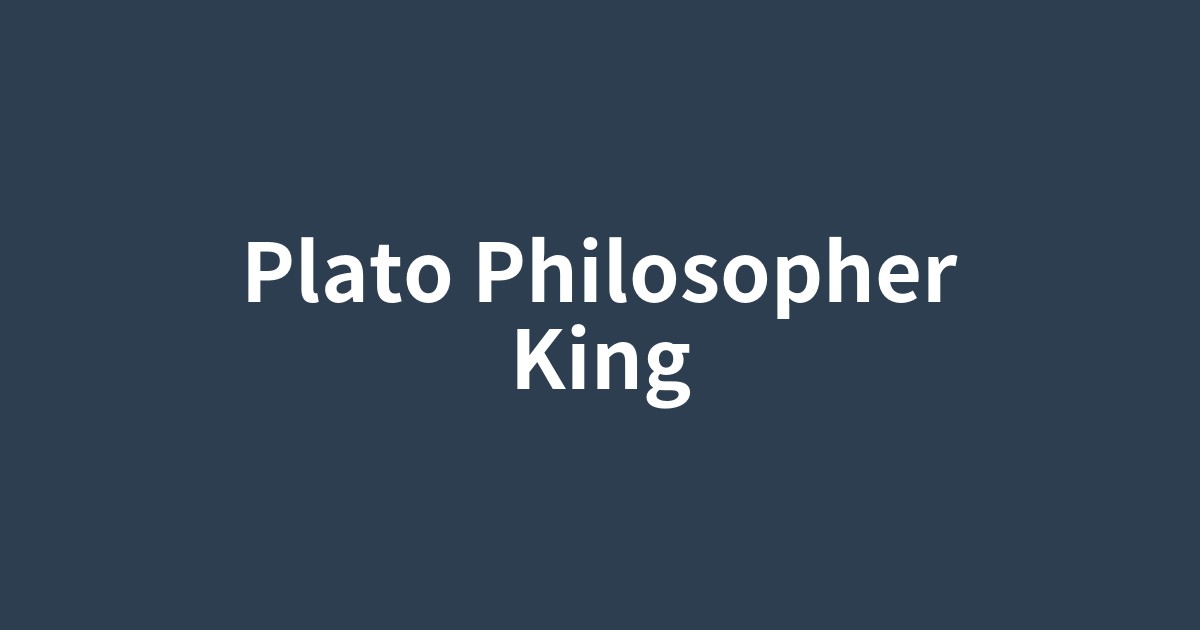このページは、歴史や文化の物語を楽しみながら、その文脈の中で重要な英単語を自然に学ぶための学習コンテンツです。背景知識を日本語で学んだ後、英語の本文を読むことで、より深い理解と語彙力の向上を目指します。

理想の国家を治めるのは「哲学者」であるべきだ。古代ギリシャの哲学者プラトンが描いた、ideal(理想)の政治体制とその問題点。
この記事で抑えるべきポイント
- ✓プラトンの「哲人王」思想とは、物事の本質であるイデア、特に「善のイデア」を認識した哲学者が国家を統治すべきだとする考え方です。
- ✓プラトンが『国家』で描いた理想国家は、魂の三部分説(理性・気概・欲望)に基づき、統治者・防衛者・生産者という3つの階級で構成されるとされました。
- ✓この思想の背景には、師ソクラテスの死を招いたアテナイの民主政(衆愚政治)への深い失望があったという側面が指摘されています。
- ✓哲人王の思想は、エリート主義や全体主義につながる危険性があるという批判を受ける一方で、現代社会におけるリーダーの理想像や資質について、根源的な問いを投げかけています。
プラトン『国家』と哲人王の思想
もし、最も賢く、最も善い人が国を治めたら、世界はどうなるだろうか? この問いは、現代社会で政治への不満やリーダーシップへの渇望を感じる私たちにとって、深く心に響くものかもしれません。古代ギリシャの哲学者プラトンは、この根源的な問いに対し、壮大かつ緻密な答えを提示しました。それが、彼の主著『国家(The Republic)』で描かれた「哲人王」の思想です。今回は、この深遠な思想の核心に迫り、その光と影を探求してみましょう。
Plato's Republic and the Idea of the Philosopher-King
What if the wisest and most virtuous person were to rule a country? This question may resonate deeply with us today, as we often feel dissatisfaction with politics and a longing for ideal leadership. The ancient Greek philosopher Plato offered a grand and detailed answer to this fundamental question. It is the idea of the "philosopher-king," depicted in his major work, The Republic. This time, let's delve into the core of this profound idea and explore its light and shadow.
なぜ「哲学者」が王になるべきなのか?―ソクラテスの死と民主政への絶望
プラトンが哲人王という過激ともいえる思想に至った背景には、彼の師であるソクラテスの死という、痛ましい出来事がありました。ソクラテスは、アテナイの市民との対話を通じて「無知の知」を説きましたが、既成の価値観を揺るがす危険人物と見なされ、民衆裁判によって死刑を宣告されます。プラトンにとって、最も賢明で正義の人であった師を死に追いやったのは、専門的な知識を持たない大衆による多数決でした。この経験から、彼はアテナイの`民主政(democracy)`が、時に優れた指導者を抹殺し、感情に流される「衆愚政治」に陥る危険性を痛感します。既存の政治体制に深い絶望を抱いたプラトンは、物事の表面ではなく本質を捉える真の知識に基づいた、新たな統治の形を模索し始めたのです。
Why Should a "Philosopher" Be King? – The Death of Socrates and Despair in Democracy
Behind Plato's arrival at the radical idea of the philosopher-king was the painful event of his mentor Socrates's death. Socrates preached the "wisdom of knowing one's own ignorance" through dialogue with the citizens of Athens, but he was seen as a dangerous figure who undermined established values and was sentenced to death by a popular tribunal. For Plato, it was the majority vote of an uninformed populace that condemned his master, the wisest and most just man he knew. From this experience, he acutely felt the danger that Athenian democracy could degenerate into "mob rule," where emotions prevail and excellent leaders are eliminated. Holding a deep despair for existing political systems, Plato began to seek a new form of governance based on true knowledge that grasps the essence of things, not just their surface appearance.
理想国家の設計図―プラトン『国家』における魂と階級
プラトンが構想した`理想(ideal)`の国家は、人間の精神構造をモデルにしています。彼は、人間の`魂(soul)`は三つの部分からなると考えました。一つは、知恵と理性を司る「理性的部分」。二つ目は、勇気や気概を司る「気概的部分」。そして三つ目が、食欲や性欲といった肉体的な「欲望的部分」です。プラトンは、国家もまた、この三つの部分に対応する階級によって構成されるべきだと主張しました。理性を体現する「統治者階級」、気概を体現する「防衛者階級」、そして欲望を担う「生産者階級」です。プラトンにとっての`正義(justice)`とは、これら三つの階級がそれぞれの役割を完全に果たし、互いに干渉せず、国家全体として調和が保たれている状態を指しました。そして、この国家の舵取りを担う統治者こそが、特別な訓練を受けた`哲学者(philosopher)`でなければならないのです。
The Blueprint of an Ideal State – Soul and Class in Plato's Republic
The ideal state that Plato envisioned was modeled on the structure of the human mind. He believed that the human soul consists of three parts. The first is the "rational part," which governs wisdom and reason. The second is the "spirited part," which governs courage and honor. The third is the "appetitive part," which deals with physical desires like hunger and thirst. Plato argued that the state, too, should be composed of classes corresponding to these three parts. The "guardian class" embodies reason, the "auxiliary class" embodies spirit, and the "producer class" handles desire. For Plato, justice was a state of harmony where these three classes perform their respective roles perfectly without interfering with one another. And the ruler who steers this state must be a philosopher who has undergone special training.
哲人王だけが見る「善のイデア」とは何か?
では、なぜ統治者は哲学者でなければならないのでしょうか。その答えは、プラトン哲学の根幹である「イデア論」にあります。彼は有名な「洞窟の比喩」を用いて、私たちが日常的に感覚で捉えている世界は、洞窟の壁に映る影のような不完全なものに過ぎないと説きました。その影の背後には、永遠不変で完璧な実在、すなわち「イデア(Form)」が存在します。例えば、私たちが目にする個々の美しい花はいつか枯れてしまいますが、「美そのもの」というイデアは永遠に存在し続けます。哲学者の仕事は、この影の世界から脱出し、物事の真の姿であるイデアを認識することです。そして、全てのイデアの頂点に君臨し、それら全てに存在理由を与える究極の真理が「善のイデア(the Form of the Good)」です。この善のイデアを認識した者だけが、何が国家にとって本当に善いことなのかを理解し、私利私欲に惑わされず、国を正しく導くことができる。これが、哲人王による統治の正当性の根拠なのです。
What is the "Form of the Good" Seen Only by the Philosopher-King?
So, why must the ruler be a philosopher? The answer lies in the core of Platonic philosophy: the Theory of Forms. Using his famous "Allegory of the Cave," he explained that the world we perceive with our senses is merely an imperfect shadow on a cave wall. Behind these shadows exists a world of perfect, eternal, and unchanging reality, namely the Forms. For example, while the individual beautiful flowers we see will eventually wither, the Form of Beauty itself exists eternally. The philosopher's job is to escape this world of shadows and recognize the Forms, the true nature of things. The ultimate truth that stands at the pinnacle of all Forms and gives them their reason for being is the "Form of the Good." Only those who have perceived this Form of the Good can understand what is truly good for the state and guide it correctly, without being swayed by personal gain. This is the basis for the legitimacy of the philosopher-king's rule.
理想か、独裁か?―哲人王思想への批判と現代への問い
プラトンの哲人王思想は、西洋哲学に計り知れない影響を与えましたが、同時に厳しい批判にもさらされてきました。特に20世紀の思想家カール・ポパーは、哲人王の思想が民衆の意見を一切反映しないエリート支配であり、個人の自由を抑圧する`全体主義(totalitarianism)`への道を開くものだと痛烈に批判しました。確かに、一部の選ばれた人間だけが真理を知り、大衆を導くという考え方は、現代の民主的な価値観とは相容れない危険性を孕んでいます。しかし、その一方で、プラトンの思想はリーダーに求められる資質とは何かを私たちに問いかけます。彼が統治者に求めたのは、単なる知識だけではありませんでした。知恵、勇気、節制、正義といった人間的な卓越性、すなわち`徳(virtue)`を兼ね備えていることこそが、最も重要な条件だったのです。
An Ideal or a Dictatorship? – Criticisms of the Philosopher-King and Questions for Today
Plato's idea of the philosopher-king has had an immeasurable influence on Western philosophy, but it has also faced harsh criticism. The 20th-century thinker Karl Popper, in particular, fiercely criticized the idea as an elitist rule that ignores public opinion and opens the door to totalitarianism. Indeed, the notion that only a select few know the truth and should lead the masses is fraught with dangers incompatible with modern democratic values. On the other hand, Plato's thought also compels us to ask what qualities are required of a leader. What he demanded of his rulers was not just knowledge. The most important condition was to possess human excellence, or virtue, such as wisdom, courage, temperance, and justice.
結論
プラトンの哲人王思想は、2400年以上前の古代ギリシャで生まれました。現代の私たちから見れば、それは非現実的で、時に危険でさえある理想論かもしれません。しかし、「理想の政治とは何か」「リーダーはどうあるべきか」という彼の根源的な問いは、今なお色褪せることなく、私たちの社会に鋭く突き刺さります。完璧な答えが見つからないからこそ、私たちはプラトンの壮大な思索を一つの偉大な出発点として、自ら考え続ける価値があるのではないでしょうか。
Conclusion
Plato's idea of the philosopher-king was born in ancient Greece over 2,400 years ago. From our modern perspective, it may seem an unrealistic and at times even dangerous ideal. However, his fundamental questions—"What is ideal politics?" and "How should a leader be?"—remain as sharp and relevant as ever, piercing through to our own society. Perhaps it is precisely because there is no perfect answer that we find value in continuing to think for ourselves, using Plato's grand speculation as a great starting point.
免責事項
- 目的について: 当コンテンツは、英語学習の一環として、歴史、文化、思想など多様なテーマを扱っております。特定の思想や信条を推奨するものではありません。
- 情報の正確性について: 掲載情報には万全を期しておりますが、その内容の完全性・正確性を保証するものではありません。学術的な見解や歴史的評価は、多様な解釈が存在しうることをご了承ください。
- 自己責任の原則: 当コンテンツの利用によって生じたいかなる損害についても、運営者は一切の責任を負いかねます。情報はご自身の判断と責任においてご活用ください。
テーマを理解する重要単語
form
プラトン哲学の根幹をなす最重要概念「イデア」を指します。通常は「形」を意味しますが、哲学文脈で大文字のFormと書かれる場合、感覚世界を超えた永遠不変の完璧な実在を意味します。これを理解することが哲人王の役割を解明する鍵です。
文脈での用例:
According to Plato, there is a perfect Form of 'justice' that exists beyond our world.
プラトンによれば、私たちの世界を超越したところに、完璧な「正義」の形相(イデア)が存在する。
soul
プラトンの国家論を理解するための基礎となる概念です。彼は国家の構造を、理性的・気概的・欲望的という三つの部分から成る人間の「魂」の構造になぞらえました。このアナロジーを把握することで、彼の階級論の意図が明確になります。
文脈での用例:
He believed that music could soothe the human soul.
彼は音楽が人の魂を癒すことができると信じていた。
democracy
この記事の核心をなす概念の一つです。プラトンは師ソクラテスを死に追いやったアテナイの「民主政」に絶望し、哲人王思想を構想しました。現代の価値観とは異なるプラトンの民主政批判を理解することが、記事全体の読解の鍵となります。
文脈での用例:
Ancient Athens is often cited as the birthplace of democracy.
古代アテネは、しばしば民主主義の発祥の地として引用される。
justice
現代では「公平さ」や「法的な正しさ」を指すことが多いですが、プラトンにとっての「正義」は異なる意味を持ちます。この記事における「正義」とは、魂や国家の各部分が自らの役割を果たし、全体が調和している状態を指す専門用語です。
文脈での用例:
The marchers were demanding social justice and equality for all.
デモ行進の参加者たちは、すべての人のための社会正義と平等を要求していた。
philosopher
この記事の主題である「哲人王」の中心をなす単語です。プラトンにとって「哲学者」とは、単に物事を考える人ではなく、物事の真の姿である「イデア」を認識できる、特別な訓練を積んだ知恵ある人を指します。この定義が統治の正当性に繋がります。
文脈での用例:
Socrates is one of the most famous philosophers in Western history.
ソクラテスは西洋史において最も有名な哲学者のうちの一人です。
ideal
「理想」という、現実には存在しないかもしれないが目指すべき完璧な状態を指します。プラトンが構想した国家は、まさにこの「理想国家」であり、現実の不完全な政治体制へのアンチテーゼでした。彼の思索の出発点を理解する上で重要な単語です。
文脈での用例:
He is the ideal candidate for the job.
彼はその仕事にとって理想的な候補者だ。
fundamental
「基本的な(basic)」よりもさらに重要で、物事の根幹を成す「根源的な」という強いニュアンスを持ちます。記事ではプラトンの問いを「根源的な問い」と表現し、それが時代を超えて私たちに問いかける本質的なテーマであることを示唆しています。
文脈での用例:
A fundamental change in the company's strategy is needed.
その会社の方針には根本的な変更が必要だ。
profound
知的、感情的に「深い」ことを表す形容詞です。この記事ではプラトンの思想を「深遠な思想」と表現し、その内容が単純ではなく、じっくりと考えるに値する奥深さを持っていることを示しています。哲学的なテーマを扱う文章で頻出する単語です。
文脈での用例:
The book had a profound impact on my thinking.
その本は私の考え方に重大な影響を与えた。
virtue
単なる善行ではなく、知恵、勇気、節制、正義といった人間的な卓越性や優れた性質を指す言葉です。プラトンが統治者に求めたのは専門知識だけでなく、この「徳」を兼ね備えていることでした。彼のリーダーシップ論の核心を捉えるための重要語です。
文脈での用例:
For the Romans, courage in the face of death was a great virtue.
ローマ人にとって、死に直面した際の勇気は偉大な美徳でした。
legitimacy
ある権力や制度が「正しい」と認められる根拠、つまり「正当性」を意味します。この記事では、哲人王による統治の「正当性」の根拠が、彼らが究極の真理である「善のイデア」を認識している点にある、というプラトンの論理を理解する上で不可欠です。
文脈での用例:
The new government is struggling to establish its legitimacy.
新政府は自らの正統性を確立するのに苦労している。
speculation
証拠が不十分な中での「推測」という意味もありますが、哲学的な文脈では、深い思考に基づく「思索」という知的なニュアンスで使われます。結論部でプラトンの思想を「壮大な思索」と評しており、その知的探求への敬意が込められています。
文脈での用例:
The stock market boom was driven by speculation rather than by genuine investment.
株式市場の好景気は、真の投資よりも投機によって引き起こされた。
resonate
物理的な「反響」から転じて、感情や考えが「心に響く、共感を呼ぶ」という意味で頻繁に使われます。この記事の冒頭で、プラトンの問いが現代の私たちに「深く心に響く」と表現されており、読者を物語に引き込む重要な役割を果たしています。
文脈での用例:
His speech resonated with the audience.
彼のスピーチは聴衆の心に響いた。
totalitarianism
個人の自由よりも国家の利益を優先し、権力が社会のあらゆる側面に介入する政治体制を指します。哲人王思想が、エリートによる支配であり、民衆を抑圧する「全体主義」につながるというカール・ポパーの痛烈な批判を理解するために必須の単語です。
文脈での用例:
The novel depicts a society crushed under the weight of totalitarianism.
その小説は全体主義の重圧の下で打ちのめされた社会を描いている。